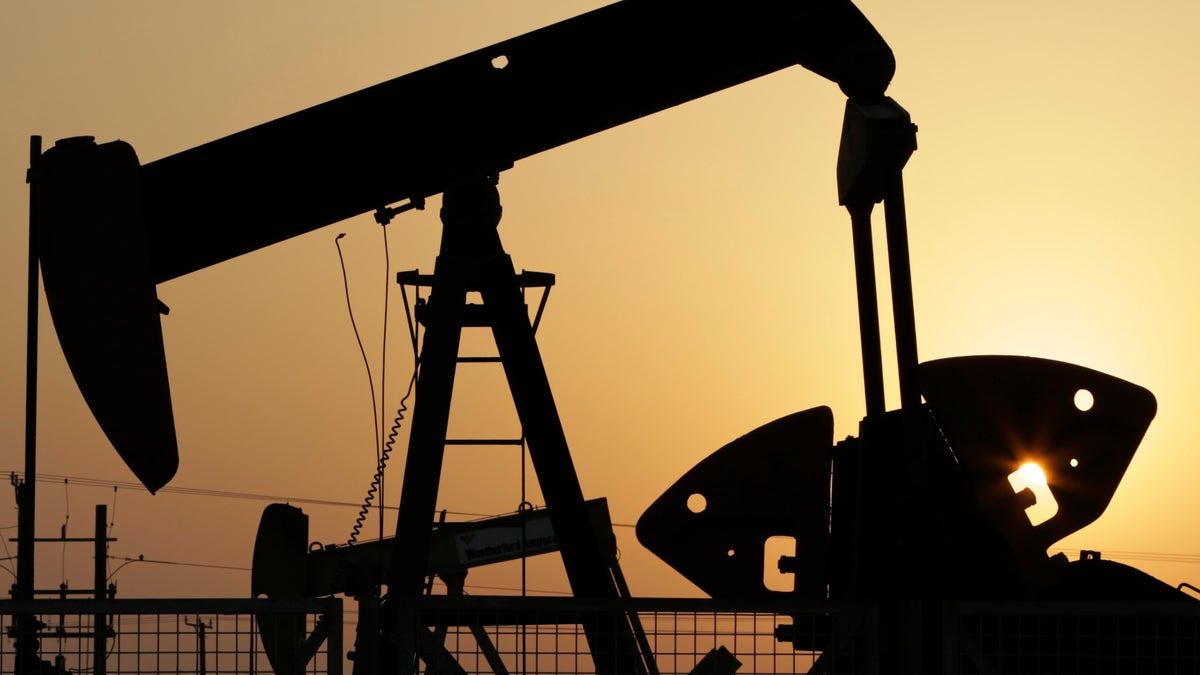
FILE -- In this Sept. 30, 2015, file photo, oil pumps work in the desert oil fields of Sakhir, Bahrain. Russias energy minister, Alexander Novak, said, Tuesday, Feb. 16, 2016, that it has agreed with Saudi Arabia, Qatar and Venezuela to freeze oil production at January 2016 levels if other producers do the same following a closed-door meeting in the Doha, Qatar. The meeting reflects growing concern among major oil producers about the effects a prolonged slump in crude prices will have on their domestic economies. (AP Photo/Hasan Jamali, File) (ap)
The agreement reached by four OPEC countries to cap their crude output comes after months of Venezuela’s aggressive push to not only freeze but reduce oil production, in an effort to stop the alarming slide of prices worldwide and bring some measure of relief to its ailing economy.
Saudi Arabia, Russia, Venezuela and Qatar made the announcement Tuesday following an unexpected meeting in the Qatari capital of Doha that pointedly did not include Iran.
Venezuela, which has the world's largest oil reserves, has suffered enormously as the price of oil has crashed from above $90 a barrel two years ago to below $30 now.
Analysts say Venezuela is getting dangerously close to just breaking even on the oil it produces, which accounts for 95 percent of export earnings.
Whether the plan will be enough to put a floor under prices is uncertain, because the proposal depends on cooperation from a range of producers with differing budget priorities.
- Venezuela´s response to food shortages? Grow your own food at home
- Venezuela Supreme Court overrides congress, grants president broader powers
- U.S. investors press on with $100M fraud lawsuit against Venezuela
- Venezuela’s government limits mall hours, depriving clientele of cherished haven
- Venezuela´s government launches Ministry of Urban Farming
Among the hardest to bring on board is Iran, which has already announced Tehran has no intention of freezing oil output levels.
Mahdi Asali, a senior Iranian Oil Ministry and Iran's OPEC envoy, said his country will in fact keep increasing its crude exports until it reaches levels attained before international sanctions were imposed on Tehran over its nuclear program.
Asali said the fall in oil prices should be blamed on oversupply and that it was up to Saudi Arabia and others to cut down production to boost oil prices. He said the four nations that participated at the Doha gathering could stabilize oil prices on their own – if they cut their production by 2 million barrels a day.
"These countries increased their production by 4 million barrels when Iran was under sanctions," Asali was quoted as saying by the Shargh daily. "Now it's primarily their responsibility to help restore balance on the market. There is no reason for Iran to do so."
Iran is eager to ramp up its exports now that sanctions related to its nuclear program have been lifted, saying recently it aims to put another 500,000 barrels a day on the market. Figures from the International Energy Agency show it pumped 2.9 million barrels daily in December, before sanctions were lifted.
Iran used to export 2.3 million barrels per day but its crude exports fell to 1 million in 2012.
The United Arab Emirates' energy minister, Suhail Mohamed al-Mazrouei's, refused on Wednesday to discuss the Doha proposal after giving a keynote address at a Dubai conference in which he mentioned low oil prices only in passing.
"I will only talk about this conference," he said, before smiling and walking away from reporters' shouted questions.
He later took to Twitter to say his country's oil policy "is open to cooperate with all producers toward mutual interest of the market stability and we are optimistic on the future."
Kuwait, another Gulf OPEC member, signaled it was willing to go along with the Doha plan.
Anas al-Saleh, who is Kuwait's deputy premier, finance minister and acting oil minister, said in a statement his country was committed to the proposal if others join in.
"Kuwait hopes the agreement would provide a positive atmosphere for oil prices, and for the market to regain balance, and calls on all to support stability of markets," he said.
